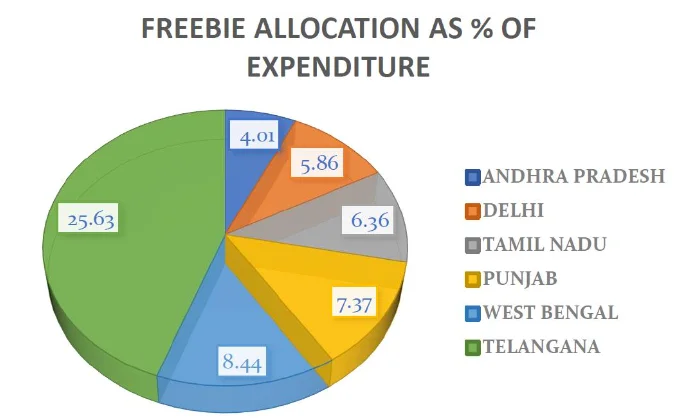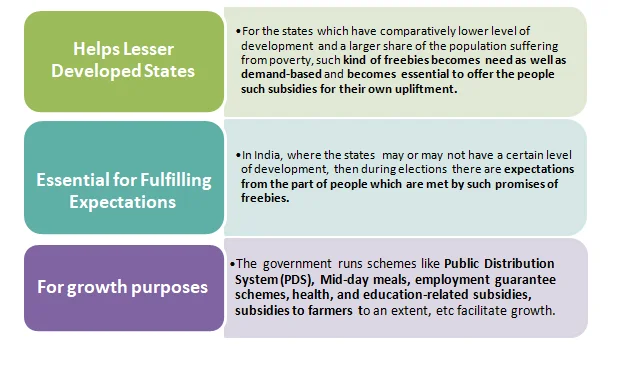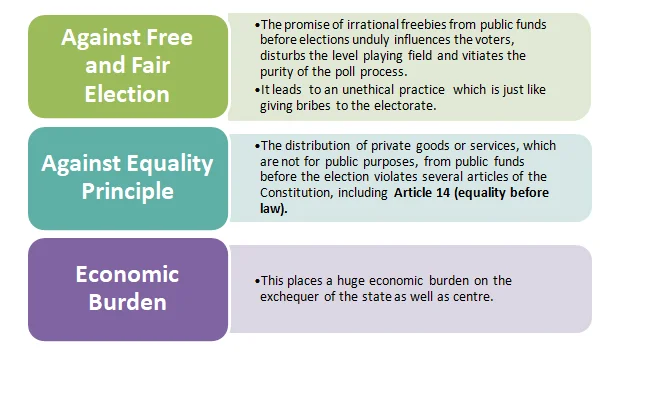Election freebies have become a common tactic used by political parties in India to win votes by promising free services and financial support. These promises often include free electricity, water supply, monthly allowances for the unemployed and women, as well as gadgets like laptops and smartphones. While appealing, the rise of these freebies raises important questions about fiscal responsibility and the long-term impact on the economy. As the country prepares for upcoming elections, it is crucial to examine the implications of these promises on both the electorate and public finances.
Enroll now for UPSC Online Course
The Impact of Election Freebies in Indian Politics: Promises, Concerns and the Way Forward
The Evolution of Freebie Politics in India
- Origins in Tamil Nadu: The politics of freebies began in Tamil Nadu in 1967 when DMK founder C.N. Annadurai promised 4.5 kg of rice for Re 1 through the public distribution system.
- Although he implemented the scheme after winning, it was soon scrapped due to financial strain.
- Expansion of Freebies: The trend intensified in Tamil Nadu during the 2006 and 2011 assembly elections, with AIADMK and DMK promising free color TVs, grinders, mixers, electric fans, laptops, land, and jobs.
- Nationwide Spread: Political analyst Javed Ansari notes that this culture began in the ’80s and ’90s in Tamil Nadu and has since spread across India, particularly among ruling parties launching populist schemes.
- Mixed Results in Elections:
- Madhya Pradesh: The BJP’s Ladli Behna Yojana helped it retain power despite long-term governance.
-
-
- Telangana: K. Chandrashekhar Rao’s BRS lost despite offering numerous freebies; Congress’s proposals were more appealing.
- Rajasthan: Congress lost power despite multiple incentives from the Ashok Gehlot government.
-
- Chhattisgarh Elections: Freebies were significant in the state elections, with both Congress and BJP offering them.
- However, the BJP won, showing that while freebies influence elections, they are not the only factor.
- Karnataka Victory: Congress’s win in Karnataka in 2023 was attributed to various freebies and anti-incumbency sentiment, highlighting the importance of credible implementation of past welfare promises.
The Role of Election Freebies in Indian Politics
- Key Strategy: Election freebies have become a key strategy for political parties in India, aiming to attract voters by promising various schemes funded by taxpayers.
- Recent Election Promises: In the recent state elections across Mizoram, Chhattisgarh, Madhya Pradesh, Rajasthan, and Telangana, political parties made numerous promises, including:
- Farm Loan Waivers
- Government Jobs
- Free Education
- Higher Cooking Gas Subsidies
- Financial Packages for Women
- Laptops for Students
- Reverting to the Old Pension Scheme (OPS)
-
-
- The assembly elections in Uttar Pradesh and Karnataka also showcased similar promises.
-
- Fiscal Concerns: While election freebies are not a new trend, their prevalence has sparked debate:
-
-
- The Union Budget 2023-24 established a committee to review the New Pension Scheme for government employees.
- The central government extended the free food grain subsidy scheme for another five years, costing an estimated ₹11.8 lakh crore.
- Critics, including Union Finance Minister Nirmala Sitharaman, warn that these promises often lack financial feasibility.
-
- Competitive Populism
-
-
- Election Outcomes: The Congress party’s freebies in Karnataka reportedly contributed to its electoral win, while the BJP’s Ladli Behna Yojana was key in Madhya Pradesh.
- Investor Concerns: A poor performance by the BJP in state polls could lead to increased fiscal populism, potentially jeopardizing fiscal discipline ahead of the 2024 General Elections.
-
- Economic Implications
-
-
- Experts estimate the fiscal impact of election promises may only be felt 12-18 months after a government takes office.
- A recent report estimated that fulfilling pre-poll guarantees in Karnataka would require about ₹60,000 crore annually.
-
- Legal Developments
-
- The Supreme Court has taken notice of the issue, issuing notices to the Madhya Pradesh and Rajasthan governments, the central government, and the Election Commission regarding the need for guidelines to regulate political party distributions of cash and freebies funded by taxpayers.
Statistics Related to Freebies
| Over Rs 1-trillion freebies announced by state govts, shows data
States must curb freebies to spend more on expanding their economies |

Supreme Court Judgement related to Election Freebies
|
Arguments Supporting Election Freebies

Arguments Against Election Freebies

Way Forward
- Need to differentiate between Subsidies and Freebies: It is essential to distinguish between subsidy and freebies as subsidies are for the justified and specifically targeted benefits that arise out of demands.
- At the same time there is a need to understand the impacts of freebies from the economic sense and connect it with the taxpayer’s money.
- Rationale behind the policies: The parties should properly understand the economics and expenditures of such policies.
- Judicious Demand-based Freebies: India being a huge diverse country, and there exists a huge number of people below the poverty line, so there should be judicious and sensible offering of freebies which does not disturb the state’s budget.
- Awareness Among People: The People should realise the wrong they do in selling their votes for freebies. If they do not resist, they cannot expect good leaders.
Enroll now for UPSC Online Course
| Must Read | |
| Current Affairs | Editorial Analysis |
| Upsc Notes | Upsc Blogs |
| NCERT Notes | Free Main Answer Writing |
Conclusion
While election freebies may provide immediate benefits to voters, they can also lead to significant economic challenges in the long run.
- It is essential for political parties to distinguish between justified subsidies and unsustainable freebies to ensure responsible governance.
- Voters must also recognize the importance of making informed choices rather than being swayed by short-term incentives. By fostering awareness and understanding of these issues, India can work towards a more accountable and sustainable political landscape.
Sign up for the PWOnlyIAS Online Course by Physics Wallah and start your journey to IAS success today!
| Related Articles | |
| Freebie Politics in India | Politics of Freebies |
| List of Finance Ministers of India (1947 to 2023) | Supreme Court |

 GS Foundation
GS Foundation Optional Course
Optional Course Combo Courses
Combo Courses Degree Program
Degree Program










